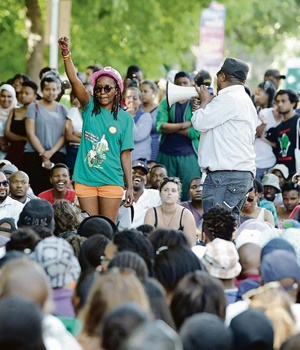
In a vice grip, vice-chancellors and government wrestle over who will pick up the R2bn bill for the fee moratorium
‘We have won a battle, but we have not won the war.”
This was the sentiment of students nationwide after Friday’s decision by government and university leaders to scrap fee increases for next year.
The decision – reached after a marathon meeting between students, vice-chancellors and government – capped a week of nationwide turmoil, which saw virtually all of South Africa’s universities shut down.
South Africans also witnessed unprecedented scenes of students clashing with police inside the parliamentary precinct, on the lawns of the Union Buildings and during a march on the ANC’s Luthuli House headquarters in central Joburg.
Yesterday, students met throughout the country to decide whether or not to call off the shutdown, with many arguing that the increase freeze was only a partial victory because other demands had not been met. Last night, Wits vice-chancellor and principal Adam Habib said students had decided to continue with the protest.
Vuyani Pambo, Economic Freedom Fighters’ leader at Wits, last night confirmed this, and told City Press students would continue with the protest tomorrow.
“Yesterday [Saturday], we had a meeting with Wits leadership and tomorrow [Sunday], we are also having a mass private meeting with them.”
But he refused to share the details of the meeting.
Wits student Mtshweni Maleleza said: “We are going to continue with the protest until our demands are met. The zero percentage doesn’t mean anything to us as students – we want free education.”
By late last night, students organised at the University of Pretoria were still deciding whether to resume classes.
Vice-chancellor Cheryl de la Rey agreed to four of 13 demands. She agreed to explore two more, but on seven of the demands (mostly related to fees and other costs), she said her hands were tied.
While it is widely expected that other classes would resume tomorrow, leaders of students representative councils (SRCs) countrywide said consultations began on Friday night and final decisions would be made today.
Sharp differences have emerged, with some students saying the pressure must be kept up.
Among the concrete concessions the students want to extract is a commitment to phase in universal free education, accelerate transformation and ensure the permanent employment of outsourced blue-collar workers such as cleaners and maintenance staff.
Members of the WhatsApp group who have been the national coordinating structure of the movement warned colleagues not to celebrate an incomplete victory.
“The struggle was that fees must fall. Not that fees must not increase. We have not achieved anything yet,” said a student leader who asked not to be identified.
Another added that “without a proper plan of increasing funding for destitute students and a commitment to scrap all historical debts, we have not won”.
University of KwaZulu-Natal SRC treasurer Sanele Mncwabe said they would “only be certain what will happen on Monday, but we hope lectures will resume”.
Academic and administrative activities at the University of the Free State are also expected to resume tomorrow.
Exams will only start next week, while additional examinations have been postponed until November 23.
The University of Pretoria said it expected all students to return tomorrow to write their exams. Tests would resume on Wednesday.
Wits University SRC secretary-general Fasiha Hassan said Friday’s victory was “just the first step” and the pressure would be kept up even if students went back to class.
“We have a mass action that we’ve built momentum around and, ultimately, the call remains: free education in our lifetime.
We know it’s not going to happen this year, or the year after. But we’ve won a battle, not the war,” she said.
Hassan said students had to sustain the pressure “now that we’ve shown them we have the power as students”.
Rhodes SRC secretary Lindokuhle Zungu said he expected students to start preparing for exams, adding that “we are out there cleaning up and getting ready for a new week”.
He said management had agreed to postpone exams, not to penalise students for missed assignments or tests, and gave those who did not do well this year a chance to rewrite next year. He said the struggle was not over.
“We are quite happy, but government must move fast and do more than just the 0% increase,” he said.
University of Stellenbosch student leader Bradley Frolick agreed, saying the 0% increase announced by President Jacob Zuma on Friday was “only the beginning”.
Vice-chancellors were the biggest losers on Friday, as their attempts to push government to commit to increase subsidies next year yielded no results.
City Press understands that they were willing to agree to scrap university fee increases provided that government stumped up money to fund the shortfalls.
However, the government delegation led by Zuma, Higher Education Minister Blade Nzimande and Science and Technology Minister Naledi Pandor was noncommittal. Instead, they strong-armed the university chiefs into finding the money from their own bank accounts.
The vice-chancellors will now return to work to do a forced revision of their annual budgets.
University of KwaZulu-Natal vice-chancellor Albert van Jaarsveld said the universities were negotiating and pushing for a “fair deal”.
He said each university would sit down with the department of higher education and training and look at the balance sheet to “see what can be done”.
North West University vice-chancellor Professor Dan Kgwadi said: “What we wanted was that if we go to zero increments, the government should step in and subsidise what universities had already budgeted.”
Unfortunately, they didn’t promise anything, he said.
University of Johannesburg vice-chancellor Professor Ihron Rensburg said the universities and government agreed they should trim operations where possible while waiting for Nzimande’s department to see if it could find subsidy funds.
SA Students’ Congress president Ntuthuko Makhombothi, who attended the meeting with Zuma, was very critical of the vice-chancellors and their councils, saying they operated like chief executives and boards of companies.
“They are concerned about financial books and not education,” he said.
Young Communist League leader Mluleki Dlelanga said the meeting was “well balanced”.
“We told him [Zuma] that parents simply cannot afford the exorbitant fees for tertiary education and we want free education before his term ends,” he said.
He added that they reminded him that free higher education was ANC policy.
The Economic Freedom Fighters’ Mpho Morolane said the consensus between government and vice- chancellors raised suspicions that they had pre-caucused the outcome.
“I was worried because they were not really engaging the vice-chancellors. It was the students who were engaging,” he said.
DA youth leader Yusuf Carrim said his impression was that President Zuma was abrogating responsibility and trying to shift the blame on to students and universities.




 Publications
Publications
 Partners
Partners








